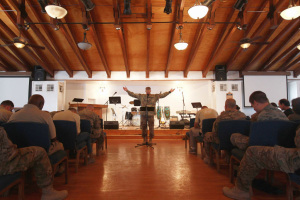Md.-based Sisters Order Files Suit Against HHS Over Mandate
A Maryland-based Roman Catholic religious order has filed a lawsuit against the Department of Health and Human Services over the federal government's controversial preventive services mandate.
The Little Sisters of the Poor, an order that oversees multiple homes for the elderly, filed suit Wednesday in the United States District Court for the District of Colorado.
In the class action complaint, the Sisters argued that they cannot comply with the final rules of the mandate due to their religious views regarding "contraception, sterilization, abortifacients, and related education and counseling."
"The government defendants have exempted thousands of plans, covering tens of millions of employees, from the Final Mandate," reads the complaint in part.
"These exemptions have been granted for a wide variety of reasons, from the purely secular exemption for plans in existence before a certain date ('grandfathered plans') to a narrow religious exemption for certain 'religious employers.' The class plaintiffs, however-despite their religious nature-do not qualify for these exemptions."
The Sisters are joined in their suit by Christian Brothers Services, a New Mexico nonprofit corporation and the Christian Brothers Employee Benefit Trust.
"The Little Sisters of the Poor vow to support and follow the teachings of the Catholic Church, including teachings on the inherent value and dignity of every human person," reads a statement on their website.
"We believe the government's attempt to coerce us in this manner is wrong, and that it violates our religious liberty."
The Sisters are being represented by the Becket Fund for Religious Liberty, which is overseeing dozens or lawsuits against the HHS mandate.
Mark Rienzi, Becket Fund senior counsel and lead counsel for the Sisters, said in a statement released Wednesday that the Sisters should be exempted from the mandate.
"The Sisters should obviously be exempted as 'religious employers,' but the government has refused to expand its definition," said Rienzi.
"These women just want to take care of the elderly poor without being forced to violate the faith that animates their work."
In June, after much feedback and controversy, the HHS unveiled its final rules for mandatory preventive services coverage.
The HHS rules provide accommodation for nonprofit religious organizations opposed to contraceptive services on conscience grounds, including third-party insurers who provide the coverage for religious entities that self-insured employees.
"The health care law guarantees millions of women access to recommended preventive services at no cost," said HHS Secretary Kathleen Sebelius in a statement.
"Today's announcement reinforces our commitment to respect the concerns of houses of worship and other non-profit religious organizations that object to contraceptive coverage, while helping to ensure that women get the care they need, regardless of where they work."
According to an HHS press release, the final rule applied a "simpler" definition for a "religious employer," including houses of worship and nonprofit religious organizations.
"With respect to an insured health plan, including a student health plan, the non-profit religious organization provides notice to its insurer that it objects to contraception coverage," reads the HHS press release in part.
"The insurer then notifies enrollees in the health plan that it is providing them separate no-cost payments for contraceptive services for as long as they remain enrolled in the health plan."
The Sisters have been unable to get an exemption and could face fines upwards of millions of dollars to the Internal Revenue Service for noncompliance.





























